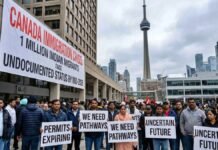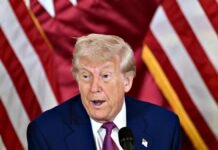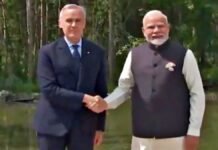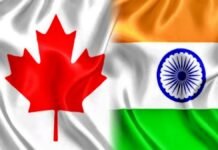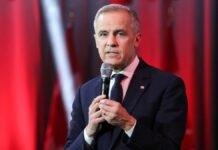
Key Highlights:
- Chrystia Freeland Resigns: Deputy Prime Minister and Finance Minister Freeland steps down after a major disagreement with PM Justin Trudeau over Trump’s 25% tariff threats.
- Political Blow to Trudeau: Freeland’s resignation is the first open dissent within Trudeau’s cabinet and could destabilize his leadership.
- Economic Fallout: Canada’s deficit swells to C$62 billion, sparking fears of fiscal mismanagement amid economic uncertainty.
- Housing Minister Resigns: Sean Fraser steps down in solidarity, deepening Trudeau’s political troubles.
- Election Pressure: Trudeau faces 20-point lag in polls behind Conservative leader Pierre Poilievre, who has repeatedly pushed for a snap election.
Ottawa: In a dramatic turn of events, Canada’s Deputy Prime Minister and Finance Minister Chrystia Freeland resigned on Monday following an escalating disagreement with Prime Minister Justin Trudeau over handling US President-elect Donald Trump’s proposed 25% tariffs on Canadian imports.
Freeland, a key member of Trudeau’s cabinet since 2015 and one of Canada’s most influential political leaders, described the situation as a “grave challenge” for the nation. “For the past number of weeks, you and I have found ourselves at odds about the best path forward for Canada,” she wrote in her resignation letter.
The departure of Freeland, 56, marks the first visible fracture within Trudeau’s Liberal government, raising concerns about his ability to hold power as the party grapples with economic pressures and declining popularity.
Trump’s Tariff Threats and Freeland’s Stand
Freeland’s resignation came amid escalating fears of a trade war with the United States after President-elect Trump announced plans for a 25% tariff on Canadian imports. She urged Ottawa to take the threats “extremely seriously” and criticized Trudeau’s fiscal decisions, which she deemed “costly political gimmicks.”
In her letter, Freeland pointedly referenced Trudeau’s recent sales tax holiday, a measure aimed at reviving Liberal fortunes but widely criticized for exacerbating Canada’s ballooning deficit. “We must keep our fiscal powder dry,” she warned, emphasizing the need for economic restraint in turbulent times.
Political and Economic Fallout
Freeland’s resignation has triggered significant political and economic concerns:
- Growing Deficit: Hours after Freeland’s exit, Canada reported a C$62 billion deficit — C$22 billion more than projections, raising alarms about fiscal mismanagement.
- Cabinet Crisis: Housing Minister Sean Fraser also resigned later on Monday, calling Freeland “professional and supportive,” adding further strain to Trudeau’s already embattled cabinet.
- Leadership Crisis: Liberal leader Trudeau, now trailing 20 points behind Conservative leader Pierre Poilievre, faces increasing calls for a snap election as dissatisfaction grows nationwide.
Poilievre wasted no time in attacking the government, stating, “The government is spiraling out of control… at the very worst time.”
Chrystia Freeland: A Political Powerhouse Steps Down
Freeland, a former journalist turned politician, has been a prominent figure in Canadian politics since joining Trudeau’s cabinet in 2015. She played a key role as:
- Trade Negotiator: Led successful free-trade negotiations with the European Union and the United States.
- Finance Leader: Became the first woman to hold the position of Canada’s Finance Minister.
- Crisis Manager: Tasked with Canada’s response to Trump’s administration and key economic challenges.
Her exit is a significant loss for Trudeau, as Freeland was widely viewed as a possible successor to his leadership.
Trudeau’s Struggles Deepen
Prime Minister Justin Trudeau, who remains resolute about leading the Liberals into the next election, faces mounting pressure:
- Declining Polls: Trudeau’s popularity has nosedived, with Pierre Poilievre emerging as the clear front-runner.
- Cabinet Dissent: Freeland’s exit, followed by Sean Fraser’s resignation, signals growing discontent within the Liberal government.
- Economic Uncertainty: With a rising deficit and looming tariff threats, Trudeau’s fiscal strategy is under intense scrutiny.
While some Canadian media speculated that Trudeau might follow Freeland’s lead and step down, his office rejected the claims as “absolutely not accurate.”
What’s Next for Canada?
Freeland’s resignation exposes deep fissures in Trudeau’s government at a critical juncture. As Canada faces:
- An impending trade conflict with the US,
- A growing budget deficit, and
- Rising political opposition,
the coming months will be pivotal for Trudeau’s leadership and the future of the Liberal party.
Political analysts warn that Freeland’s departure could embolden opposition forces and amplify calls for a snap election, with Conservative leader Pierre Poilievre poised to capitalize on Liberal instability.

A Political Earthquake with Far-Reaching Consequences
Chrystia Freeland’s shocking resignation has sent ripples across Canada’s political landscape, exposing cracks in Trudeau’s leadership at a time of economic and geopolitical uncertainty. Her departure, coupled with mounting pressure from opposition leader Pierre Poilievre and growing economic concerns, sets the stage for a high-stakes political showdown in the months ahead.
As Canada braces for Trump’s trade policies and battles its fiscal woes, Trudeau’s government faces its toughest test yet. Whether the Liberals can regroup or crumble under pressure remains to be seen.



































